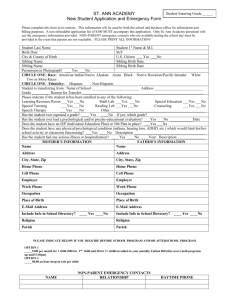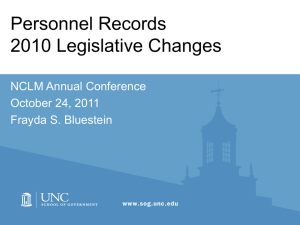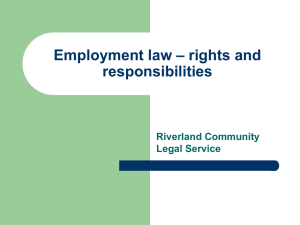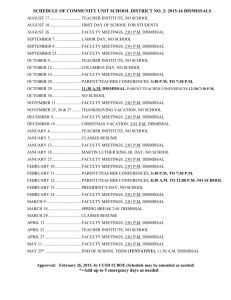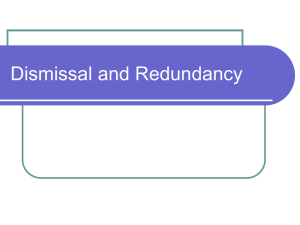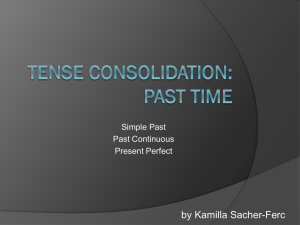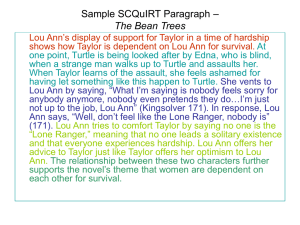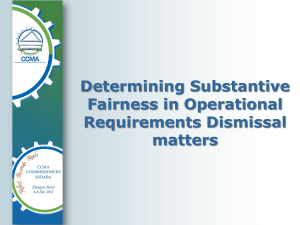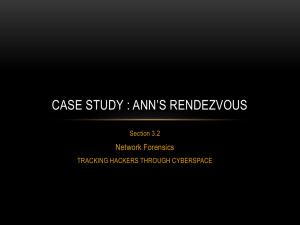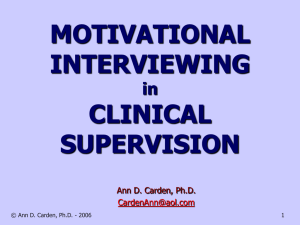In Basket Activity
advertisement
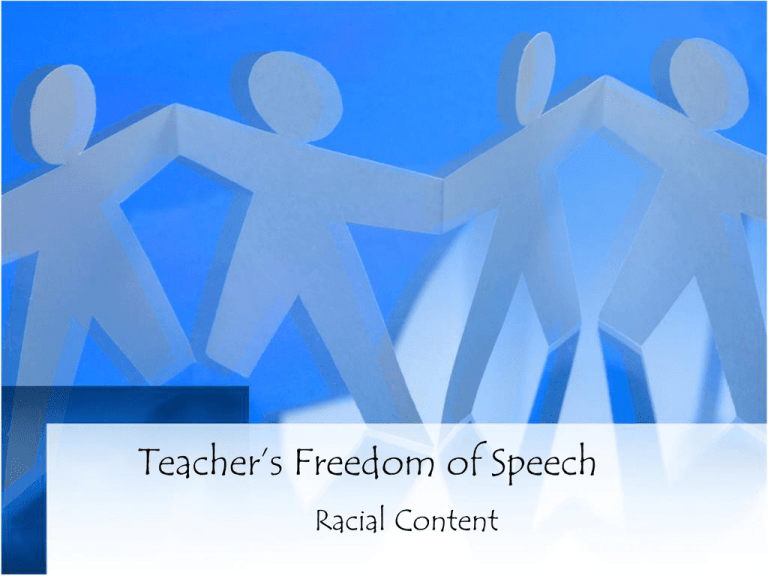
Teacher’s Freedom of Speech Racial Content Teacher Freedoms • Teachers do not lose their rights as a condition of accepting employment with a public school • Teachers are subject to reasonable restraints if legitimate, defensible rationale is established by the school district. Teacher Freedoms – due process • Procedural – may not deprive any person of “life, liberty, or property without due process of law.: • Substantive – state must have valid objective if it intends to deprive a teacher of “life, liberty, or poperty, and the means used must be reasonably calculated to achieve its objective.” • Both procedural and substantive must be met in teacher dismissal proceedings. Freedom of Expression – within school • First Amendment – freedom of expression applies to teachers • Limited to the requirement that it does not create a material disruption to the educational interests of the school district – Interference with others’ rights – Creates negative impact on school discipline and decorum Freedom of Expression • School officials may not justifiably “prohibit or penalize the teacher in any manner for exercising a constitutionally protected right without showing that a legitimate state interest is affected by the teacher’s speech or expression.” • Districts have successfully disciplined teachers when – Personal speech undermined authority – Personal speech adversely affected working relationships • Connick v. Myers, 461 U.S. 138 (1983) – expressions regarding public concerns receive first amendment protections but ordinary greivances are to be handled by the administrative body without the court. Freedom of Expression- outside of school • Teachers may speak on issues that interest them in the community – even if it may not be acceptable to school district officials • Should preface that he or she is speaking as a private citizen rather than an employee of the district • Teacher’s speech should be professional and not designed to harm or injure another’s reputation or render the teacher unfit • Pickering v. Board of Education, 391 U.S. 563 (1968) – teacher dismissed for letter to editor regarding superintendent’s statements – Supreme court ruled that the teacher’s exercise of right to speak on issues of public importance may not be the basis for his dismissal Freedom of Expression – outside of school • May be disciplined if the speech… – Breeches loyalty or confidentiality – Creates material and substantial disruption – Affects the efficient operation of the school – Renders the teacher unfit Scenario Freddie Watts, principal, and Jimmy Brothers, assistant principal, are African American administrators assigned to administer a predominantly black high school. Ann Griffin, a white tenured teacher, during a heated conversation with the two administrators stated that she “hated all black folks.” When word leaked on her statement, it caused negative reactions among colleagues both black and white. The principal recommended dismissal based on concerns regarding her ability to treat students fairly and her judgment and competency as a teacher. Group Questions • Is Watts justified in his recommending Ann’s dismissal? Why or why not? • Is the principal overreacting to Ann’s statement? Why or why not? • Does Ann’s statement establish a basis for dismissal? Why or Why not? • Can Ann make the case that her statement was a private statement that does not give rise to serious disciplinary action? Why or why not? • As a principal, would you have made a similar recommendation for dismissal? Why or why not? Is Watts justified in his recommending Ann’s dismissal? Why or why not? In my opinion… Yes, because… Ann’s opinion could create a material disruption to the educational interest of the school district because it creates a negative impact on the school Is the principal overreacting to Ann’s statement? Why or why not? • In my opinion… No, because… Making a highly racist comment, stating that she hates people of a certain race, would render her unfit to perform her duties which include working with African American colleagues and teaching African American students. Does Ann’s statement establish a basis for dismissal? Why or Why not? In my opinion… Yes, because… This type of personal speech adversely affected working relationships. She was speaking as an employee of the district. She was speaking unprofessionally and created a material and substantial disruption in the school setting based on the negative reaction of colleagues in the school setting. Can Ann make the case that her statement was a private statement that does not give rise to serious disciplinary action? Why or why not? In my opinion… No, because… Her comments were not prefaced by a statement that she was speaking as a private citizen, rather than an employee. Even if she had stated this, the nature of her position and the image she is expected to project along with the harmfulness of her statement would impose reasonable restrictions on her right to make this statement without resulting in disciplinary action. As a principal, would you have made a similar recommendation for dismissal? Why or why not? Yes. This teacher’s statements not only caused a material and substantial disruption to the school environment and negatively affected working relationships. It was also a harmful and hurtful statement that would render her unfit to perform her duties. Rationale I believe the court would rule in favor of the school district in this case because of the following points. - Material and substantial disruption - Unfit to perform duties, given the nature of her position - Adversely affected working relationships - Statement was harmful and interfered with the rights of others - “to hold for the teacher in private expressions would be to transform every personal grievance to protected speech when complaints are raised about classroom materials, teacher aids, laboratory equipment and other related issues.” Daniels v. Quinn, 801 F. 2d 687 (4th Cir. 1986) Case Law Cited • Connick v. Myers, 461 U.S. 138 (1983) • Daniels v. Quinn, 801 F. 2d 687 (4th Cir. 1986) • Pickering v. Board of Education, 391 U.S. 563 (1968)
